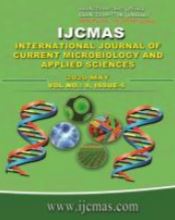


 National Academy of Agricultural Sciences (NAAS)
National Academy of Agricultural Sciences (NAAS)

|
PRINT ISSN : 2319-7692
Online ISSN : 2319-7706 Issues : 12 per year Publisher : Excellent Publishers Email : editorijcmas@gmail.com / submit@ijcmas.com Editor-in-chief: Dr.M.Prakash Index Copernicus ICV 2018: 95.39 NAAS RATING 2020: 5.38 |
Forty two genotypes of tomato including four check cultivar (GT-2, GT-6, JT-3 and Pusa Ruby) were planted in Randomized Block Design, during rabi 2018 and were assessed to know the nature and magnitude of variability and genetic divergence for twelve traits. The experimental results revealed a wide range of variability for all the traits under study. High heritability coupled with high genetic advance was observed for number of fruits per plant, plant height, fruit length, fruit girth, shelf life of fruits, tomato leaf curl virus incidence, average fruit weight, fruit borer damage and number of locules per fruit which offers the better scope for improvement through selection. Based on the Mahalanobis D2 statistics, forty two genotypes of tomato were grouped into three clusters. Maximum number of genotypes were accommodated in the cluster-I (40) followed by cluster-II (1) and cluster-III (1). Highest inter cluster distance of 273.83 was recorded between cluster I and III, hence, crossing between the genotypes of these cluster is expected to yield more heterotic hybrids. On the other hand, six genotypes viz., NTL-72, NTL-81, NTL-84, NTL-53, NTL–65 and NTL-31 performed better for important traits under study. These genotypes need further testing to be released as a substitute of already existing tomato varieties or these can be crossed with diverse genotypes of other clusters for the development of superior hybrids in tomato.
 |
 |
 |
 |
 |